 Petzlover
Petzlover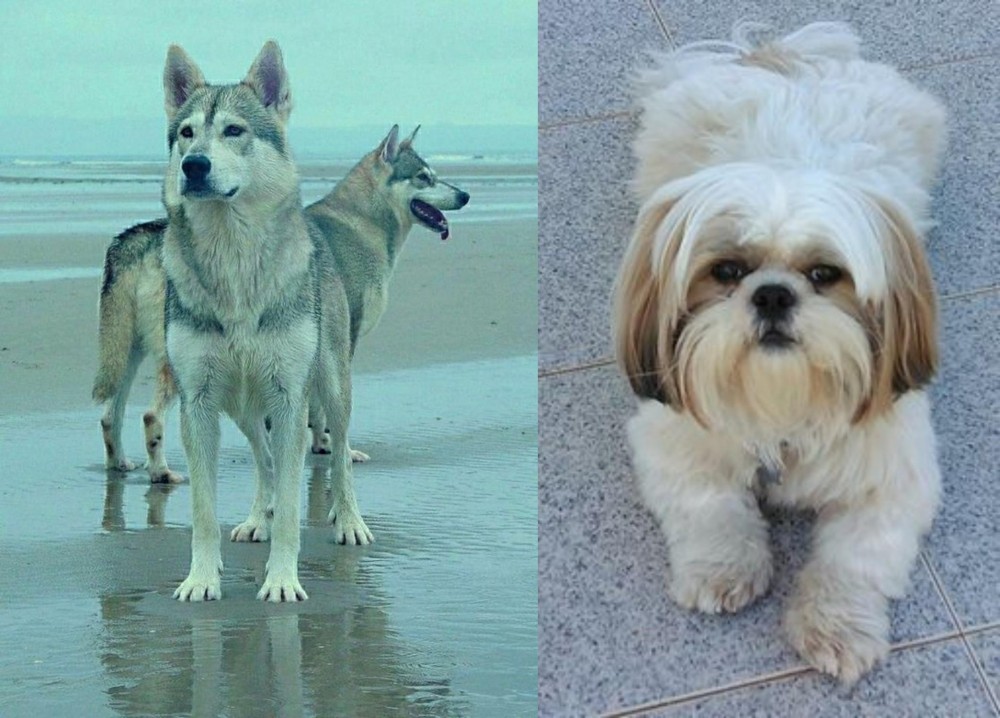 Northern Inuit Dog is originated from United Kingdom but Shih Tzu is originated from China. Northern Inuit Dog may grow 53 cm / 21 inches higher than Shih Tzu. Northern Inuit Dog may weigh 41 kg / 91 pounds more than Shih Tzu. Northern Inuit Dog may live 4 years less than Shih Tzu. Northern Inuit Dog may have more litter size than Shih Tzu. Northern Inuit Dog requires Moderate Maintenance. But Shih Tzu requires High Maintenance
Northern Inuit Dog is originated from United Kingdom but Shih Tzu is originated from China. Northern Inuit Dog may grow 53 cm / 21 inches higher than Shih Tzu. Northern Inuit Dog may weigh 41 kg / 91 pounds more than Shih Tzu. Northern Inuit Dog may live 4 years less than Shih Tzu. Northern Inuit Dog may have more litter size than Shih Tzu. Northern Inuit Dog requires Moderate Maintenance. But Shih Tzu requires High Maintenance
 Looking at the beautiful Northern Inuit Dog, you’ll think that this crossbred dog is a wolf.
Looking at the beautiful Northern Inuit Dog, you’ll think that this crossbred dog is a wolf.
As with many other dogs, there are sometimes different stories regarding their history. It was in the 1980's that founder of the breed, Eddie Harrison, bred a number of mixed-breed rescue dogs with Siberian Huskies, German Shepherds and Alaskan Malamutes to produce the early Northern Inuit dogs. This is a dog that closely resembled a wolf in looks but which has the more companionable characteristics of the domesticated dog.
The dog is only recognized by its own independent breed club, but by none of the other major kennel clubs.
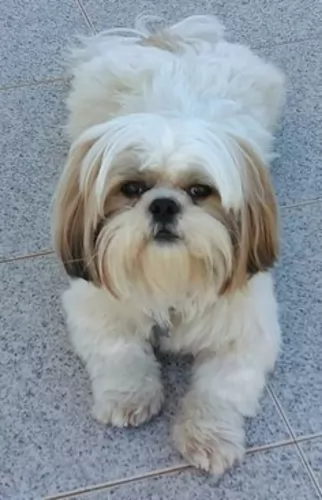 The Shih Tzu is an Imperial Chinese breed developed by palace breeders hundreds of years ago with breed stock from the Tibetan lines. It is quite probable that the Shih Tzu was originally a cross between two Sino-Tibetan ancient dogs – the Pekingese and the Lhasa Apso. Based on their looks, the Shih Tzu means the lion dog, but they were really very pampered palace dogs living with the Chinese emperors and families. The emperors were always gifting the breeders who developed the most affectionate, gentle and beautiful Shih Tzus.
The Shih Tzu is an Imperial Chinese breed developed by palace breeders hundreds of years ago with breed stock from the Tibetan lines. It is quite probable that the Shih Tzu was originally a cross between two Sino-Tibetan ancient dogs – the Pekingese and the Lhasa Apso. Based on their looks, the Shih Tzu means the lion dog, but they were really very pampered palace dogs living with the Chinese emperors and families. The emperors were always gifting the breeders who developed the most affectionate, gentle and beautiful Shih Tzus.
Until the 1930’s the Shih Tzu was not known to the world outside the emperor’s palace. Once the breed did come out from behind the palace walls, they were immediately popular. Much debate went on about how to refine the breed as clubs began to spring up in Peking and then in England. It was not until 1969 the Shih Tzu was recognized and entered in the AKC Stud Book.
While the original Shih Tzu might have been a mix between the Pekingese and the Lhasa Apso, today’s breed spread around the world after the second world war. In Europe in the 1930’s the breed was classified as Apsos. In 1935 the first Shih Tzu Club of Europe was formed, and the first standard was written, and the breed was categorized as the Shih Tzu.
Following World War II, soldiers brought the dogs to the States from Europe. By the 1950’s the breed was growing in popularity and the AKC recognized the breed in 1969 as members of the Toy Group. They are now recognized by all major kennel clubs throughout the western world. They are recognized by the Federation Cynoloqique Internationale in the Companion and Toy Group, among Tibetan breeds.
The Shih Tzu is a good watchdog, but it was bred to be a companion animal. It is a friendly, open breed that welcomes strangers. They are great with other animals and children as well as adults.
 Friendly, calm and gentle, the Northern Inuit Dog is a crossbreed, described as a medium to large sized dog that stands at roughly 58– 81cm in height, male and female, and weighs in the region of 25–48kg.
Friendly, calm and gentle, the Northern Inuit Dog is a crossbreed, described as a medium to large sized dog that stands at roughly 58– 81cm in height, male and female, and weighs in the region of 25–48kg.
He has a double coat in typical wolf shades of grey, white, black and cream. He is regarded as a moderate shedder. The ears are erect, the face bright, intelligent and alert and the tail long, bushy and straight.
The Northern Inuit dog is independent, strong-willed and stubborn, and if you want to own one of these dogs, your dog will respond well if you are firm, fair, strong, kind and consistent. This is because the dog is stubborn, sharp, independent and intelligent.
The owner of such a dog must be a firm leader. Training and socialization should start when the dog is still young. He is good with kids, being playful and affectionate with them.
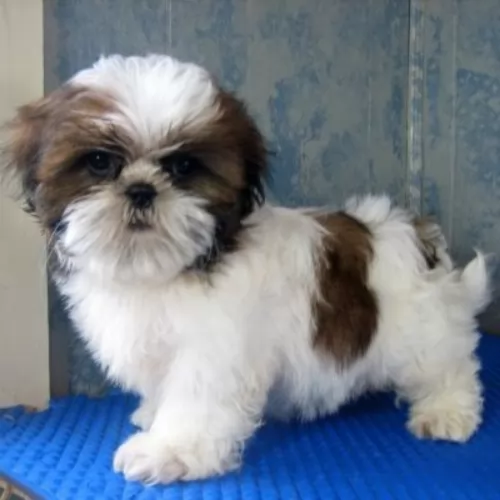 This is a breed of lively, sturdy and alert little dogs with a beautiful double coat that is flowing and long. In its full glory the Shih Tzu coat is touching the floor all the way around the dog. The dog’s bearing is as royal as its history, arrogantly carrying his head high and his tail curving over his back.
This is a breed of lively, sturdy and alert little dogs with a beautiful double coat that is flowing and long. In its full glory the Shih Tzu coat is touching the floor all the way around the dog. The dog’s bearing is as royal as its history, arrogantly carrying his head high and his tail curving over his back.
The Shih Tzu is a solid, compact breed with weight and substance. They may be a small dog, but they are a strong one. They have large dark eyes with a short muzzle and fur covered drop ears. They are just a little longer than they are tall with a distinct underbite.
There are a few differences between the European or UK Kennel Club standard and the American Kennel Club AKC standard. As opposed to the UK standard the AKC standard states that:
• The hindquarters are muscular while the front are straight. They are balanced in that they are not too long or too short.
 It’s not surprising that people who love wolves would want a similar looking pet. However, they also want this wolf-like dog to be a friend and companion. This is precisely what they get with the beautiful Northern Inuit dog.
It’s not surprising that people who love wolves would want a similar looking pet. However, they also want this wolf-like dog to be a friend and companion. This is precisely what they get with the beautiful Northern Inuit dog.
With his bright, alert face, the Inuit is actually a calm, gentle dog, bonding closely with his human family and not showing any aggression.
Intelligent and social, and somewhat stubborn, when you provide him with the home he deserves, you’ll see that this beautiful creature can be relied on to be a wonderful family pet.
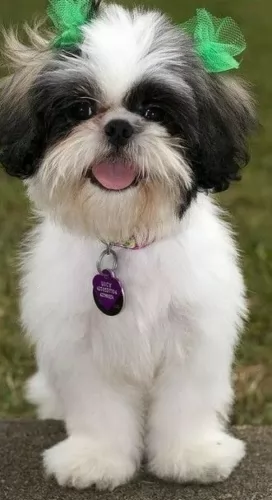 2.Special talents – they were bred to be companion animals. They are friendly and loyal.
2.Special talents – they were bred to be companion animals. They are friendly and loyal.
3.Adaptability Yes very much so. They can live in an apartment or on a farm. It doesn’t matter and they don’t need a yard.
 There are some genetic problems with this dog breed, although with good care, you are highly unlikely to see your dog with them.
There are some genetic problems with this dog breed, although with good care, you are highly unlikely to see your dog with them.
Some of these are hip dysplasia and epilepsy.
Hips are always a worrisome aspect with dogs as it can bring on lameness. There are some things that can be done to reduce the incidence of hip dysplasia.
Joint laxity in dogs occurs when the head of the femur doesn’t fit into the acetabulum properly. This could be the result of several things such as the dog being overweight, injury or something else.
Epilepsy in dogs is a chronic condition that results in seizures. This neurological disorder is actually a life-long disease, occurring when there is abnormal electrical activity in the brain and which changes a dog’s behavior.
Some breeds are more predisposed to epilepsy than others but you will need to get your dog to the vet when you see your pet jerking uncontrollably. Most of these epileptic fits happen without warning, they last a few seconds to a minute or so and stop on their own.
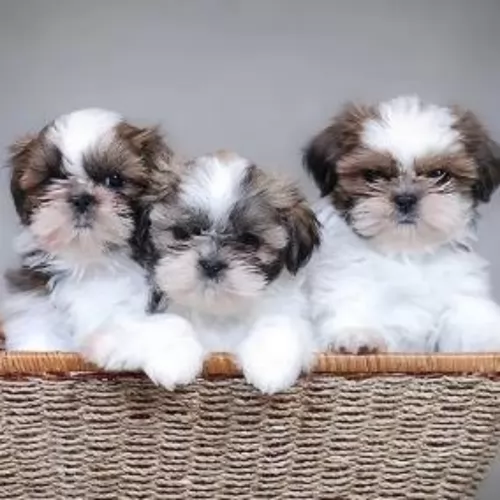 For many breeds that have the advantage of isolation like the Shih Tzu did with the emperors of China usually have very little genetic health issues. Most of the breed is indeed healthy but there are some issues.
For many breeds that have the advantage of isolation like the Shih Tzu did with the emperors of China usually have very little genetic health issues. Most of the breed is indeed healthy but there are some issues.
• Brachycephalic airway obstructive syndrome due to the shape of their face and head causes them to have breathing issues. They cannot handle heat and they cannot swim. They can have an upper airway obstruction that makes it hard for them to breath. If this is bad enough, surgery may be required.
• Hypothyroidism – thyroid does not produce the hormones necessary for metabolism to work effectively. This can lead to weight gain, hair loss, lethargy and muscle loss. It can be treated effectively.
• Issues of the eyes include – cataracts, corneal dryness and inflammation, progressive retinal atrophy, improperly closing eyelids and retinal detachment.
 It’s no longer cheap caring for a dog – just like with a child, by bringing a dog into your home, you have a responsibility to care for it.
It’s no longer cheap caring for a dog – just like with a child, by bringing a dog into your home, you have a responsibility to care for it.
If you bring a puppy into your home, you will need to feed him 4x a day. If you feed him commercially manufactured food it will need to be specially formulated for puppies. You will have to read on the packaging to make sure you get the right food.
Later on your pet can start having one or two meals a day. Two smaller meals is best as then he doesn’t gobble up his food too fast which can lead to a life-threatening condition known as bloat. Home-made food is always a welcome treat for your pet, but keep it simple and consistent. Boiled chicken, brown rice or pasta and some cooked vegetables such as carrots, sweet potatoes and spinach chopped up and added to his dry kibble can offer him some variety from time to time as well as also adding in some raw meat when you get the chance. He must always have access to fresh, cool water.
Your puppy will be due at the vet for his first vaccinations. Your puppy's first vaccination will usually be at about 8 weeks of age.
Your new pet will require a warm, dry, comfortable place to sleep and to retreat to.
You will need to provide him with chewy toys to stimulate him both mentally and physically.
You will need to exercise your pet – nice long walks, ball- and rope games etc.
Nearly every dog sheds, and the Northern Inuit will require you brushing him twice a week to remove all those loose hairs. During the brushing session, check him over for fleas and ticks and run your hands over him and make sure there are no unusual lumps on his body.
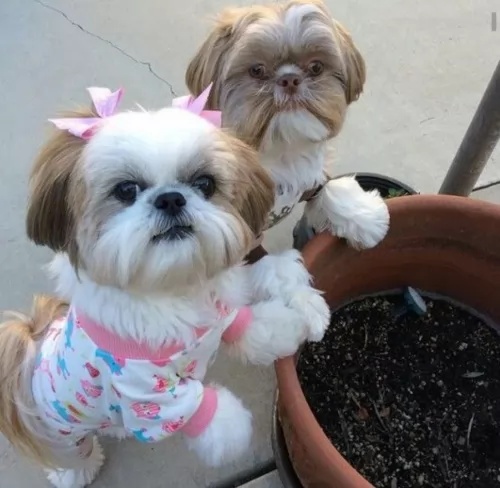 1.Feeding the puppy – this is a toy dog so don’t overfeed. They have a tendency to become obese. Calorie and weight level need to be calculated with any diet you feed. The diet should be high quality with plenty of protein made for toy dogs. Feed the puppy at least 3 times a day, maybe four in very small amounts, never more than ½ cup per day.
1.Feeding the puppy – this is a toy dog so don’t overfeed. They have a tendency to become obese. Calorie and weight level need to be calculated with any diet you feed. The diet should be high quality with plenty of protein made for toy dogs. Feed the puppy at least 3 times a day, maybe four in very small amounts, never more than ½ cup per day.
2.Feeding the adult - this is a toy dog so don’t overfeed. They have a tendency to become obese. Calorie and weight level need to be calculated with any diet you feed. The diet should be high quality with plenty of protein made for toy dogs. Feed the adult once or twice a day in larger amounts than the puppy but never more than ¾ of a cup per day.
3.Points for Good Health - most Shih Tzu’s are hardy with exceptionally good health.
This is a pampered, not high energy dog. However, she still needs playtime, which can be indoors and short walks outdoors every day.